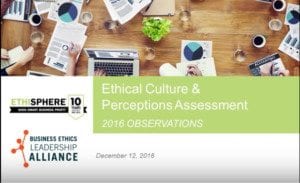 Ethisphere recently hosted a webinar featuring key findings from our Ethical Culture and Perceptions Assessment. As we always do, we highlighted a few leading practices from our dataset. In particular, we noted that 76 percent of the 2016 World’s Most Ethical Companies honorees include questions designed to measure employee perceptions of an ethical culture on a HR or engagement survey, while 62 percent of the same group run a separate survey specifically designed to measure ethical culture and/or employee perceptions of the ethics and compliance program. A question was raised by an attendee about the difference between both surveys and why a company might run both.
Ethisphere recently hosted a webinar featuring key findings from our Ethical Culture and Perceptions Assessment. As we always do, we highlighted a few leading practices from our dataset. In particular, we noted that 76 percent of the 2016 World’s Most Ethical Companies honorees include questions designed to measure employee perceptions of an ethical culture on a HR or engagement survey, while 62 percent of the same group run a separate survey specifically designed to measure ethical culture and/or employee perceptions of the ethics and compliance program. A question was raised by an attendee about the difference between both surveys and why a company might run both.
It was a record-screeching kind of a moment. It deserved more time than I could give it in the webinar.
To answer the first question, the key difference between an employee engagement survey and a culture survey is the scope. The focus of an engagement survey is on the employee’s perception of the company as a whole, and on how they feel about their job. Questions about pay and benefits, promotion opportunities and perceptions of leadership are common. You almost always find a “would you recommend a friend should work here” type question. A compliance officer willing to work cooperatively with HR can usually get a handful of ethical culture related questions on an engagement survey, such as the degree to which an employee sees a manager as a resource or a role model, but the length of the survey is almost always a limiting factor. After all, if you make a survey too long, you risk affecting the response rate or getting significant push back from the company on the time it takes to respond. Companies can find some interesting information in data pivots in an engagement survey – for example, are employees who see their manager as an ethical role model more likely to view senior leadership favorably? – but the fact that ethical culture is not the focus significantly limits how useful the data will be to a compliance officer. And that makes some sense – the compliance officer is not the key consumer of the data in an engagement survey.
On the other hand, a true ethical culture survey focuses in on how employees perceive the ethics and compliance function and its related resources and whether they trust the company enough to raise their hand when something goes wrong. I’ve addressed the eight pillars of a good culture survey before, so I won’t rehash them here; suffice it to say that the compliance officer is the key consumer of the data in a culture survey, and those companies who have run them, with us or otherwise, know just how insightful the data can be. For example, one of our clients narrowed an organizational justice issue (employees feeling strongly that people would not be treated the same) down to a particular regional manager that was, in fact, playing favorites when it came to discipline around conflicts of interest. Moreover, a good culture survey also explores whether employees feel pressure to compromise the code or policy to achieve business goals – not a question one commonly finds in an engagement survey – and if they do, where that pressure comes from. Trust me, the data from that has led to some very interesting conversations around performance incentives.
Now for the second question – why a company might run both. The short answer is that the audiences for each are different. The data provides different insights that inform and impact different strategic decisions. The committee of the board interested in the culture survey results would not be the same as the one interested in the engagement survey answers. One common objection to running two is over-surveying, and it’s a legitimate concern, but one that can be overcome either by running the two on different cycles, such as opposing years, or by running one or both to a statistically significant sample of the population instead of to all employees. Using a sample limits the exposure of employees to both surveys while still allowing both constituencies to get the data they need.
Bottom line – if you have not run a culture survey because “HR does their own,” stop and reconsider that decision. After all, are you getting the data you need?
Listen to the webinar here.



